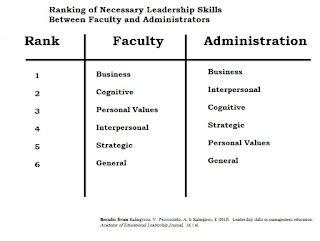Leadership has become a more
important focal point of conversations. Understanding the factors of leadership
within a transforming educational environment can help college faculty and administrators
better understand those skills and abilities which foster appropriate change.
Leadership skill has been tested within the hospitality academic fields to
better understand the perceptual differences between those who run a college
and those who work within it.
Leadership can be seen as a
combination of personality traits, abilities and gifts (Kenny & Zaccaro,
1983). People are born with certain leadership abilities that develop over time
through effort and willpower. However, this does not take into consideration
the multiple factors of development that can occur through different social
situations and how these social situations foster leadership.
Leadership can also be seen as
derived from the result of individual behaviors within a social context (Blake
& Mouton, 1978). Under such social circumstances, skillfulness is
demonstrated by effective action (Katz, 1955). Through pressing times, people
with leadership skills may employ those skills to achieve a defined objective;
even when such skills were not exhibited before.
Even though leadership can be
associated with, the way people think they are only precursors to what may
actually happen under the right circumstances. Behavioral-based theories
measure leadership by what actually was exhibited in certain pressing
circumstances (Northouse, 2007). What is done may vary be the way people think
but only through “trial by fire” do meaningless words turn into effective
action that come to define the true leader.
Effective leaders have a few
traits that help separate them from others. High performing leaders tend to
focus on interpersonal skills (Boyatzis, 1982) and problem-solving or
decision-making abilities (Connelly, et. al., 2000). To put together the right
solutions for the varying problems at hand leadership is derived from the
following three factors (Mumford, et. al., 2000):
1.) Creative problem-solving
skills
2.) Social judgment skills
3.) Knowledge
Under such circumstances, leaders
can find solutions to problems, able to judge their social environment and use
their prior knowledge to make proper decisions. Social judgment can be seen as
the ability to perspective take, perceptive in social situations, have behavioral
flexibility, and create social performance (Mumford, et. al, 2000). In order to
judge difficult situations and find solutions to ill-defined problems leaders
need to quickly use information about tasks and the people they work with to
create effective solutions (Mumford, et. al., 2000).
This quick witted and social
grace allows leaders to create higher levels of performance when the timing is
right. Such leaders quickly scan their environment to understand the factors,
put together their prior knowledge to find solutions, and use their social
skills to influence others. With these three factors, they are able to overcome
problems that others may have a hard time fathoming.
A study conducted by Kalargyrou, Pescosolido, &
Kalargiros in 2012 helps to determine the perceived skills of leaders within the
hospitality management education programs at the college level. The study used
236 professors and administrators from baccalaureate and graduate problems that
were registered with the International Council on Hotel, Restaurant, and
Institutional Education (I-CHRIE).
The results of the survey indicate that faculty and
administrators ranked business skills as the most important set of leadership qualities.
This was followed by cognitive, interpersonal abilities and strategic decision-making
abilities. To both faculty and administrators it is important for leaders to develop their business skills and use them in both personal and social ways to solve complex problems
Each of the concepts are defined as follows:
1.) Business skills: Management skills, management
of personnel, financial management, and management of material resources.
2.) Financial Skills: Management of material
resources that includes fundraising, budgeting, accounting, technology, sales,
curriculum, and marketing.
3.) Cognitive Skills: Effective communication and
the ability to adapt to changing environments.
4.) Interpersonal Skills: The ability to create
positive public relations, empathy, respect hospitality, forgiveness,
trustworthiness, and caring.
5.) Personal Values: The ability to act both
ethically and fairly with people.
Boyatzis, R. E. (1982). The competent manager: A
model for effective performance. New York:Wiley & Sons.
Blake, R. & Mouton, S. (1978). The new
managerial grid. Houston, TX: Gulf.
Connelly, M., Gilbert, J.,
Zaccaro, S. , Threlfall, K., Marks, M. , & Mumford, M., (2000). Exploring
the relationship of leader skills and knowledge to
leader performance. Leadership Quarterly, 11(1), 65–86.
Kalargyrou, V. Pescosolido, A. & Kalargiros, E (2012). Leadership skills in management education. Academy
of Educational Leadership Journal, 16, ( 4).
Katz, R. L. (1955). Skills of an effective
administrator. Harvard Business Review, 33(1), 33-42.
Kenny, D. & Zaccaro, S.
(1983). An estimate of variance due to traits in leadership. Journal of
Applied Psychology, 68, 678-685.
Mumford, M. D., Zaccaro, S. J.,
Connelly, M. S., & Marks, M. A. (2000). Leadership skills: Conclusions and
future directions. Leadership Quarterly, 11(1),
155-170.
Northouse, P. (2007). Leadership theory and
practice. Thousand Oaks, CA: Sage publications.
Bookmark with Your Social Network

No comments:
Post a Comment